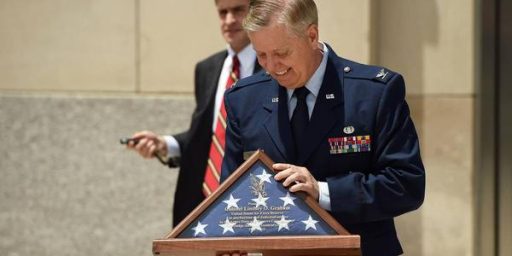Unwanted Help
Jim Henley points to a CNN report as evidence that the “few bad apples” refrain is wrong:
A congressman with experience in military detention said Saturday that the Pentagon rejected an Army plan to send him to advise the military police commander who oversaw Baghdad’s Abu Ghraib prison in the early months of the war in Iraq.
***
Buyer, an Indiana Republican and a lieutenant colonel in the Army Reserve, served as a legal adviser in 1991 during the Persian Gulf War, he said during a telephone interview with CNN about a story first reported by The Associated Press.
He served the 800th Military Police Brigade — the same brigade assigned to Abu Ghraib.
“Some of the lessons learned (during the gulf war) were about how important it was to have JAG officers at the facilities,” Buyer said, referring to military legal advisers.
Jim concludes, “Abu Ghraib worked precisely the way the high command wanted it to work.”
Or perhaps the Pentagon decided that they could get by without the advice of a part-timer whose last relevant experience was as, what, a captain during the Gulf War? Who would have been junior to and actually subordinate to people in his own chain of command that he’d be advising? Or that he would be crossing into a rather murky area of separation of powers, with one foot in the executive branch and another in the legislative? (I’ve long thought that Congressmen should have to resign their reserve commissions or at least go into the inactive reserve.)
Clearly, there is a complicated situation here. The intermingling of intelligence and enemy prisoner detention was not according to regulation. And the role of civilian contractors in this business is far from clear. But what seems certain at this point is that the military itself is taking care of the problem, was doing it long before it became a media scandal, and can do it without the help of a reserve lieutenant colonel.




You’re missing the point. Even if they simply decided that Buyer wasn’t the right guy for the job, why didn’t they choose someone else? Why did they deliberately choose not to have legal oversight at any of the prisons? This has been standard practice in the past.
OT but. . . James, who won the Blue Guy caption contest?
Wrong – the obvious answer is to throw more lawyers (JAG) at the problem – warfighting is a legal function, don’t you know? Every soldier needs a legal advisor at his elbow. The treaties and Law of War are getting too complicated for the soldier to understand the maze of rules.
Seriously though, I do wonder where the JAG was (singular?). You can’t tell me a two-star didn’t have at least one around, and probably more. I would like to see them (the JAGs that no one is talking about) go to Courts Martial for dereliction of duty (or lesser included offenses) in this case. A much smaller Joint Reserve unit I have worked with had 3 JAGs (all of them very competent). Don’t tell me they were busy making up wills (which should have been done pre-deployment).
I think we may have another scandal here – JAGs (laywers) not fulfilling their responsibilities. Maybe this is a true root cause. This is all conjecture on my part – but I think the JAGs were all sitting back in the relatively safe Green Zone rather than advising the troops in the field that needed them. (Not saying that all of them were, but where were the ones for the 800th MP – MD & SC/GA Guard?).
While I’m on a roll here – civilian contractors can be tried in Federal Court for laws broken overseas – law changed around 2000 – OK, a few Constitutional issues (this has never been done, so has never been challenged). The change was really aimed at dependents overseas. Example, if a dependent spouse killed the servicemember, sometimes the local cops had problems prosecuting (and the Feds had no jurisdiction). This is even more true for a case of spouse abuse, or child abuse. All the could be done was to ban the folks from military installations. Ditto for a case of DOD (non-military, such as school teachers) employees and their families. So the law was changed, and included contractor employees.
—